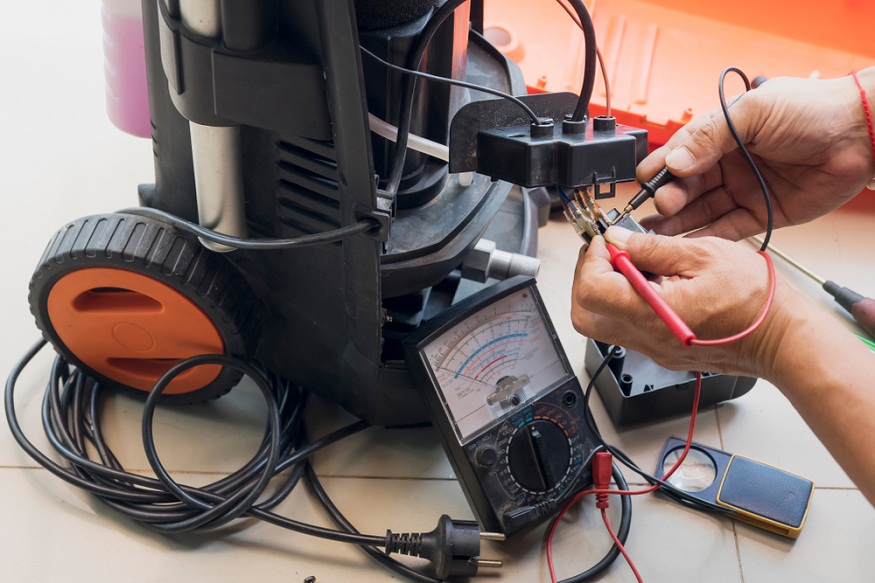Top 5 Power Washer Issues Every User Should Know About
Power washers are essential tools for cleaning a variety of surfaces, from driveways and patios to cars and decks. They can make tough jobs much easier, saving time and effort. However, like any mechanical device, power washers can experience problems. While some minor issues may be resolved with a bit of troubleshooting, others may require professional attention. If you notice a problem that you can’t easily fix, it’s always a good idea to contact a professional to ensure the job is done right and your equipment is well-maintained.
In this post, we’ll walk you through the top 5 power washer issues every user should be aware of and explain why professional repair might be necessary for certain situations.
1.Low Water Pressure
Low water pressure is one of the most common problems faced by power washer users. If your power washer is not delivering the expected high-pressure water stream, it can make cleaning tasks frustrating and inefficient. This issue can stem from a variety of factors, including clogged nozzles, low water supply, or problems with the pump.
What causes low water pressure?
- Clogged nozzle: Over time, debris and dirt can clog the nozzle, restricting the flow of water. This issue can usually be fixed by cleaning the nozzle.
- Dirty or damaged filters: Filters are designed to prevent dirt and debris from entering the pump, but they can become clogged. If not cleaned regularly, they can cause a reduction in water pressure.
- Water supply issues: Ensure that the water source feeding the power washer is adequate. Low water pressure from the hose or inadequate water supply can result in weak performance.
- Pump problems: The pump is the heart of the power washer, and if it’s malfunctioning, you’ll notice a significant decrease in water pressure. If the pump is the issue, it’s best to call a professional repair technician to inspect and replace it if needed.
When to call a professional: If cleaning the nozzle, filter, or hose doesn’t improve the situation, there may be an issue with the pump or internal components. A professional repair technician can assess the condition of the pump, seals, and other parts to determine the root cause of the problem.
2. Engine Won’t Start
Power washers with gas engines can sometimes be difficult to start, especially after long periods of inactivity. An engine that won’t start can be incredibly frustrating, and it may be caused by several factors, including fuel system issues, spark plug problems, or carburetor malfunctions.
What causes the engine not to start?
- Old or stale fuel: Fuel that has been sitting in the tank for a while can go stale, causing starting problems. Always use fresh fuel, and if you haven’t used your power washer in some time, drain the tank before storing it for the off-season.
- Spark plug issues: A worn-out or dirty spark plug can prevent the engine from starting. Cleaning or replacing the spark plug may solve the problem.
- Carburetor issues: If the carburetor is clogged or malfunctioning, it may prevent the engine from starting or running properly. This requires professional attention to repair or replace the carburetor.
When to call a professional: If cleaning the spark plug or replacing the fuel doesn’t solve the issue, it’s time to call a power washer engine repair NJ. The carburetor may need to be cleaned or replaced, or there could be an underlying issue with the engine that requires specialized knowledge to fix.
3. Water Leaks
Leaks are another common issue with power washers. If water is leaking from the hose, pump, or connections, it can cause a loss of pressure and lead to inefficient cleaning. Leaks can occur due to damaged seals, worn-out hoses, or loose fittings.
What causes water leaks?
- Damaged seals or O-rings: Over time, seals and O-rings can wear out and crack, causing water to leak from the pump or other components. These parts are relatively easy to replace, but if not properly maintained, the issue may worsen.
- Worn-out hoses: Power washer hoses are exposed to high-pressure water and can become worn over time. Cracks or holes in the hose will cause water to leak. Replacing the hose may be necessary to prevent further damage.
- Loose connections: Sometimes, leaks are simply the result of loose or improperly connected fittings. Tightening the connections might resolve the problem, but be careful not to overtighten, as this can cause further damage.
When to call a professional: If the leaks persist despite replacing the hose or tightening the connections, it could indicate a more serious issue with the pump or internal seals. A power washer hose repair NJ technician can diagnose the problem and repair or replace damaged components.
4. Unusual Noise
If your power washer starts making unusual noises, such as grinding, squealing, or banging sounds, it’s important to address the issue quickly. Strange noises often indicate that something is wrong inside the power washer, and ignoring the problem can lead to more serious damage.
What causes unusual noise?
- Dirty or damaged pump: If the pump is clogged or has damaged internal components, it may produce unusual sounds. A pump with worn-out seals or bearings can also create a grinding noise.
- Loose parts: Sometimes, loose bolts, nuts, or screws can cause rattling or squealing noises. These parts should be tightened or replaced as needed.
- Belt problems: If the power washer is belt-driven, a worn or misaligned belt could create screeching or grinding sounds.
When to call a professional: If the noise is coming from the pump or internal components, it’s best to contact a professional. They can disassemble the unit, check for any internal damage, and replace worn-out parts.
5. Loss of Power
If your power washer is running, but you notice a significant drop in power, it may be due to several factors, including issues with the engine, pump, or pressure regulator.
What causes loss of power?
- Dirty air filter: A clogged air filter restricts airflow to the engine, leading to a drop in power. Cleaning or replacing the air filter can help restore performance.
- Fuel problems: Old or contaminated fuel can prevent the engine from running at full power. Make sure to use fresh, clean fuel for optimal performance.
- Faulty pressure regulator: The pressure regulator controls the flow of water to maintain consistent pressure. If it’s malfunctioning, you may experience a drop in power.
When to call a professional: If the loss of power persists despite cleaning the air filter or replacing the fuel, it’s time to call a professional. A technician can inspect the pressure regulator, pump, and engine to identify the source of the issue.
Conclusion
Power washers are powerful tools that can make outdoor cleaning tasks much easier, but they can experience problems from time to time. The issues discussed above—low water pressure, engine starting problems, water leaks, unusual noises, and loss of power—are some of the most common problems faced by power washer users. When such issues arise, power washer repairs and sales become essential. While some issues can be addressed with basic maintenance and troubleshooting, it’s important to seek professional help for more serious problems, especially those related to the engine, pump, or internal components. A professional repair technician can diagnose the issue accurately and ensure that your power washer is running smoothly for years to come. Additionally, if you’re in need of a replacement or upgrade, many repair shops also offer sales of new power washers, helping you find the right model for your needs.


Leave a Reply
You must be logged in to post a comment.